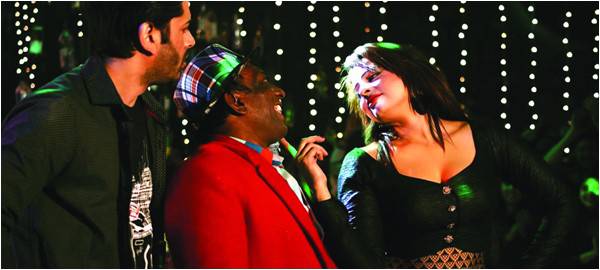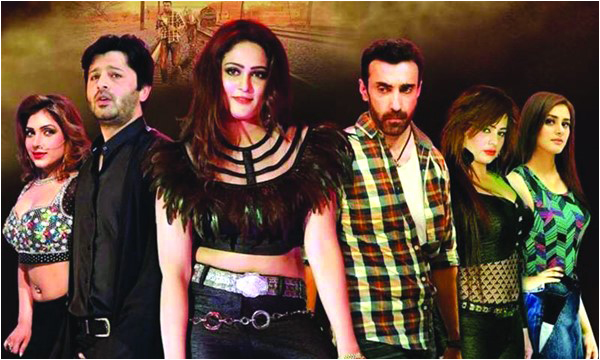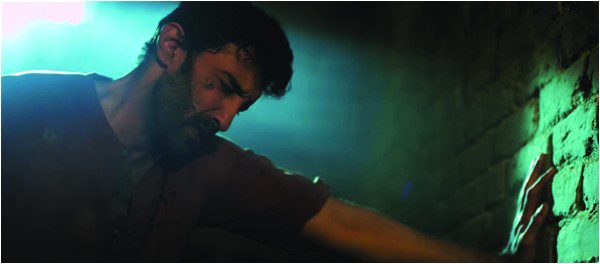
If you are a Pakistani filmmaker, the current times would be the most suitable to release your film. After all, there’s a complete ban on Bollywood – which doesn’t seem to be going anywhere any time soon – and indeed even the release of Hollywood films in the country isn’t quite as smooth, owing to a multitude of reasons.
Even with Hollywood in play, there is a great vacuum for local filmmakers to showcase their work, given that the most popular industry in Pakistan can no longer release films here. But instead of making something – let alone the most – of this opportunity, you go out and exhibit Junoon-e-Ishq.
Now more than evaluating the film itself – given that it provided absolutely no excuse for one to do so – what Junoon-e-Ishq inevitably does is make one ponder where the passion and love for filmmaking actually is in the country.

Assuming that the final product involved the exercise of multiple functional human brains, one shudders to think of everything that the film might have left out. Junoon-e-Ishq is the sort of product that one would be embarrassed to put their name over.
And yet Wajid Zuberi does own that he wrote the story which forms the foundation of the shambles that erupt on the screen. The writing not only reflects complete lack of familiarity with modern day sensibilities, it actually promotes ideas that would’ve been largely frowned upon two decades ago.

Naseem Haider Shah probably should have lesser inhibitions in owning the final product given that this is precisely that he has been coming up with for years. However, nobody actually seemed to have given him a reminder throughout the shooting of the film that the year that we currently live in is 2019.
The nonchalance with which violence is not only depicted, but justified, unveils everything you need to know about whatever else the film might have to showcase. Among other milestones that Junoon-e-Ishq creates is in cinematography and basic camerawork, with bulging fake backgrounds used in a product that hired the services of people who self-identify as professionals in the field.

The cast – Adnan Khan, Mahi Khan and Aamir Qureshi – unfortunately would be easily identifiable given that they provide their faces to the film. But of course, one doesn’t actually feel sorry for any of them given that they all should be content in making significant contributions to the catastrophe that they create in unison.
However, in such a situation one can always try and gauge which of the actors was the worst of the lot. Adnan Khan would probably win this particular race, which also includes veterans like Shahid and Rashid Mehmood. They should get special awards for consenting to be a part of this unapologetic trash.
Even so, there is one thing that nobody can take away from Junoon-e-Ishq. It’s the honesty that it depicts in its trailer. You would know exactly what you are going to get in that little preview, after which the joke is entirely on you for purchasing the ticket. Little wonder then that the film couldn’t even last a week and had to be taken down – a week, one has to emphasise, without any Bollywood films in Pakistani theatres.
So back to the original question: how are such films actually being made in the country in 2019? Where is the junoon and ishq for filmmaking? Do these people not watch any contemporary work? Forget what the rest of the world is doing, it appears as though this lot hasn’t watched any Indian, or even Pakistani, movie this decade.
Pakistani films lacking technical expertise or financial handicaps is something that can be forgiven and overlooked. What is inexcusable is writing garbage as screenplay, acting which would put kindergarten performers to shame and direction that lacks the basic understanding for filmmaking in the year 2019.
Even with Hollywood in play, there is a great vacuum for local filmmakers to showcase their work, given that the most popular industry in Pakistan can no longer release films here. But instead of making something – let alone the most – of this opportunity, you go out and exhibit Junoon-e-Ishq.
Now more than evaluating the film itself – given that it provided absolutely no excuse for one to do so – what Junoon-e-Ishq inevitably does is make one ponder where the passion and love for filmmaking actually is in the country.

Assuming that the final product involved the exercise of multiple functional human brains, one shudders to think of everything that the film might have left out. Junoon-e-Ishq is the sort of product that one would be embarrassed to put their name over.
And yet Wajid Zuberi does own that he wrote the story which forms the foundation of the shambles that erupt on the screen. The writing not only reflects complete lack of familiarity with modern day sensibilities, it actually promotes ideas that would’ve been largely frowned upon two decades ago.

Naseem Haider Shah probably should have lesser inhibitions in owning the final product given that this is precisely that he has been coming up with for years. However, nobody actually seemed to have given him a reminder throughout the shooting of the film that the year that we currently live in is 2019.
The nonchalance with which violence is not only depicted, but justified, unveils everything you need to know about whatever else the film might have to showcase. Among other milestones that Junoon-e-Ishq creates is in cinematography and basic camerawork, with bulging fake backgrounds used in a product that hired the services of people who self-identify as professionals in the field.

The cast – Adnan Khan, Mahi Khan and Aamir Qureshi – unfortunately would be easily identifiable given that they provide their faces to the film. But of course, one doesn’t actually feel sorry for any of them given that they all should be content in making significant contributions to the catastrophe that they create in unison.
However, in such a situation one can always try and gauge which of the actors was the worst of the lot. Adnan Khan would probably win this particular race, which also includes veterans like Shahid and Rashid Mehmood. They should get special awards for consenting to be a part of this unapologetic trash.
Even so, there is one thing that nobody can take away from Junoon-e-Ishq. It’s the honesty that it depicts in its trailer. You would know exactly what you are going to get in that little preview, after which the joke is entirely on you for purchasing the ticket. Little wonder then that the film couldn’t even last a week and had to be taken down – a week, one has to emphasise, without any Bollywood films in Pakistani theatres.
So back to the original question: how are such films actually being made in the country in 2019? Where is the junoon and ishq for filmmaking? Do these people not watch any contemporary work? Forget what the rest of the world is doing, it appears as though this lot hasn’t watched any Indian, or even Pakistani, movie this decade.
Pakistani films lacking technical expertise or financial handicaps is something that can be forgiven and overlooked. What is inexcusable is writing garbage as screenplay, acting which would put kindergarten performers to shame and direction that lacks the basic understanding for filmmaking in the year 2019.

